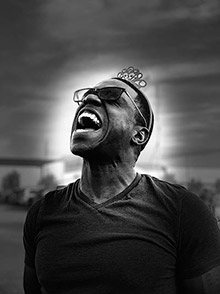
Emile DeWeaver
About the Artist

Emile DeWeaver is a Black community organizer, literary writer, and journalist who co-founded Prison Renaissance while serving a 67 years to life sentence in prison. He participated in the passage of Senate Bills 260, 261, and Proposition 57. His personal essays have been published in Rumpus and Seventh Wave, and his op-eds have been published in the Mercury News and San Francisco Chronicle. His sentence was commuted by Gov. Jerry Brown in December 2017 for his community service.
A poem by Emile DeWeaver: Sin of Kingdoms
About Artistic Ensemble
The Artistic Ensemble is a troupe of 16 diverse men in prison working with 5 outside members. In our explorations to discover how we can reach the public, we also discover more about what it means to be human by connecting with each other. Our creative process is dialogic. Together we explore social inequalities with language, sound, and movement.
It is through the collaborative effort between outside Artistic Ensemble members and incarcerated Artistic Ensemble members, that we take constraints and boundaries and turn them into tools of liberation: art, dialogues, confrontation. Our stories cannot be properly told without the echoes of our voices, you cannot picture our world unless we are behind the camera.
There is nothing about us, without us.
Message From the Ensemble
The Artistic Ensemble has gone beyond the norms of entertainment for public enjoyment, or being a platform to showcase diverse talent. It’s through our creative process which is multifaceted, we have now become a tool for restorative justice and rehabilitation through performing arts. By creating introspective and socially conscious art we’ve become a vehicle for change through community building, healing and re-entry assistance for returning citizens.
The performing arts with its universal ability to transcend the limitations of gender, race, class, and religion has allowed A.E. to create a safe space to explore the human condition, by having difficult conversations about sensitive social issues. This level of shared vulnerability opens the door to experiences, feelings, and emotions, which are the pathways to a deeper sense of empathy and understanding. In efforts to cultivate human and environmental connection.
The performing arts, for a long time has been overlooked as being a tool for re-connecting society to its higher state. A state of human decency, kindness, and freedom: a freedom to explore the unknown, and to question what’s known. A freedom to be. A.E.’s ideals of art being a source of healing and community building in conjunction with the principles of restorative justice allows A.E. to bridge the gap between art and rehabilitation. We are forging a new path of social and environmental equity through abstract and expressive art.
The performing arts, for a long time has been overlooked as being a tool for re-connecting society to its higher state. A state of human decency, kindness, and freedom: a freedom to explore the unknown, and to question what’s known. A freedom to be. A.E.’s ideals of art being a source of healing and community building in conjunction with the principles of restorative justice allows A.E. to bridge the gap between art and rehabilitation. We are forging a new path of social and environmental equity through abstract and expressive art.
—Nate, Artistic Ensemble